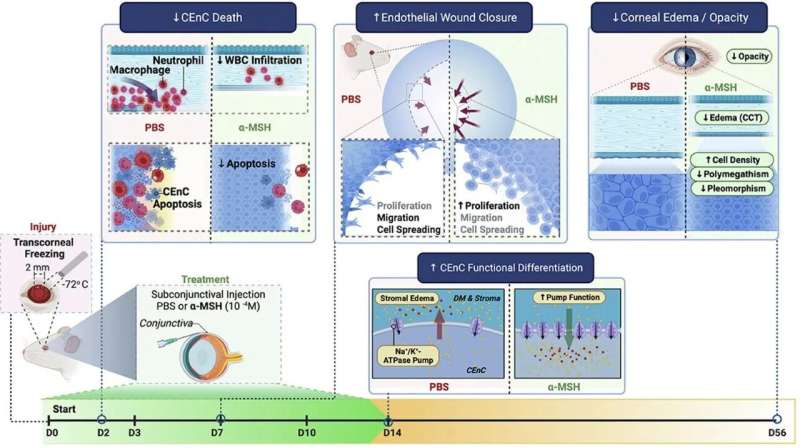This article has been reviewed according to Science X's editorial process and policies. Editors have highlighted the following attributes while ensuring the content's credibility:
fact-checked
peer-reviewed publication
trusted source
proofread
Study indicates a potential treatment for corneal endothelial disease, reducing the need for corneal transplants

Findings from a study in The American Journal of Pathology reveal that administration of the neuropeptide α-melanocyte–stimulating hormone (α-MSH) promotes corneal healing and restores normal eye function to an otherwise degenerating and diseased cornea by providing protection against cell death and promoting cell regeneration.
Due to a lack of currently available medical therapy, patients suffering from corneal endothelial disease, which leads to corneal swelling and potentially blindness, commonly require corneal transplantation. In fact, corneal transplantation is the most common type of transplant performed.
According to the investigators at Mass Eye and Ear of the Harvard Medical School Department of Ophthalmology, there is an urgent unmet need for safe and effective medical strategies for the prevention and reversal of persistent corneal edema. Therefore, there is a pressing need for the development of efficacious treatment for preventing and potentially reversing corneal edema due to corneal endothelial cell (CenC) loss following corneal injury.
This study examined the effect of local administration of α-MSH on persistent corneal edema and endothelial regeneration in an established model of injury-induced endothelial decompensation. The results show the impressive therapeutic potential of promoting the melanocortin pathway using α-MSH, thus opening new avenues of therapy.
Lead investigator Reza Dana, MD, MSc, MPH, Director of the Cornea and Refractive Surgery Service at Mass Eye and Ear, and Claes H. Dohlman Professor of Ophthalmology at Harvard Medical School, explains, "Our data, demonstrating the potent therapeutic effects of α-MSH through melanocortin receptor agonism, provide compelling evidence for the therapeutic potential of this pathway for a wide array of ocular disorders such as Fuchs Dystrophy, a common disease and indication for corneal transplantation, as well as other disorders of the corneal endothelium that lead to corneal swelling."
α-MSH is an evolutionarily conserved neuropeptide derived from the proteolysis of the pro-opiomelanocortin and exerts an array of functions through different melanocortin receptors expressed in various tissues. Findings in this seminal study show that administration of α-MSH:
- Prevents corneal endothelial cell death
- Restores normal endothelial function
- Permits the cornea to resume normal thickness after a severe injury that normally leads to corneal thickening
- Causes corneal cells to regenerate
Interventions to prevent corneal edema following ocular injury are currently limited to topical hypertonic saline and topical anti-inflammatory drugs. However, these interventions have limited efficacy, and they do not prevent CEnC decompensation.
Dr. Dana concludes, "The findings of our study suggest the therapeutic potential of α-MSH, or analogs that work by activating the melanocortin receptor system, in management of pathologies where there is a risk of corneal endothelial dysfunction, such as corneal injury or intraocular surgery. This study outlines the critical role played by neuropeptides in CEnC maintenance and offers a novel perspective on their potential application in corneal endothelial regeneration."
More information: Hamid Alemi et al, The Neuropeptide α-Melanocyte–Stimulating Hormone Prevents Persistent Corneal Edema following Injury, The American Journal of Pathology (2023). DOI: 10.1016/j.ajpath.2023.09.007




















